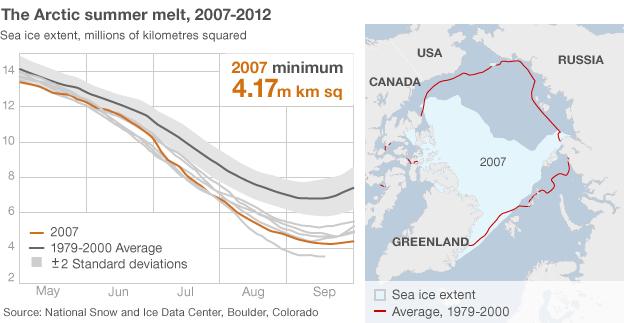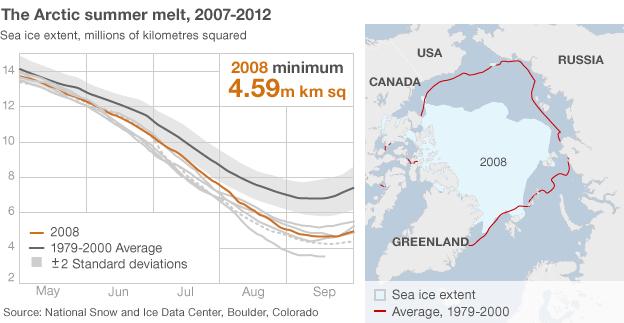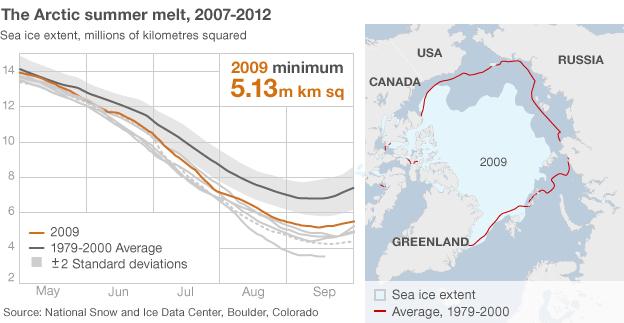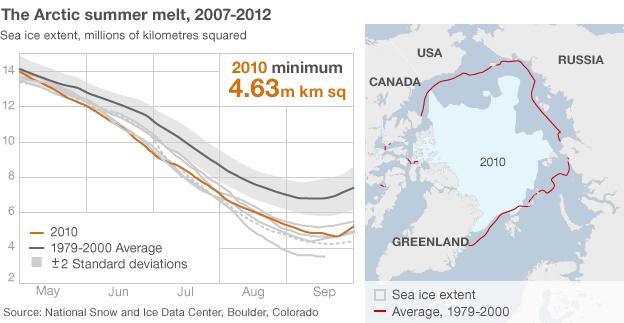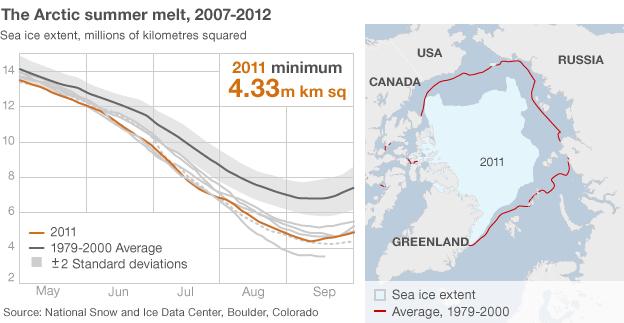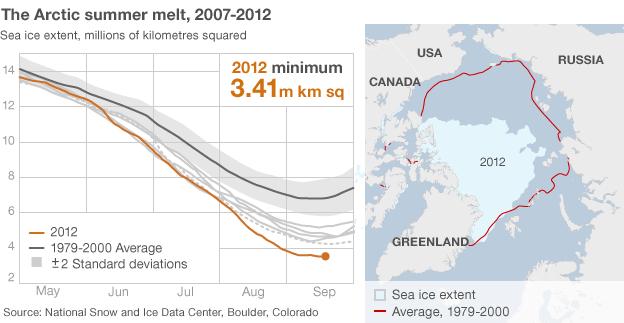Record minimum for Arctic sea ice
- Published
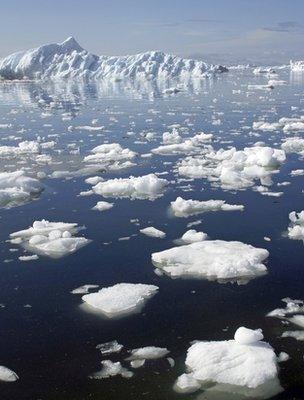
The late season decline is thought to indicate how thin the ice now is
Arctic sea ice has reached its minimum extent for the year, setting a record for the lowest summer cover since satellite data collection began.
The 2012 extent has fallen to 3.41 million sq km (1.32 million sq mi) - 50% lower than the 1979-2000 average.
Arctic sea ice has long been regarded as a sensitive indicator of changes in the climate.
Scientists who have been analysing the startling melt think it is part of a fundamental change.
"We are now in uncharted territory," said Mark Serreze, director of the National Snow and Ice Center (NSIDC) in Colorado, US, external.
"While we've long known that as the planet warms up, changes would be seen first and be most pronounced in the Arctic, few of us were prepared for how rapidly the changes would actually occur."
This year's minimum caps a summer of low ice extents in the Arctic, external. On 26 August, sea ice extent fell to 4.10 million sq km (1.58 million sq mi), breaking the previous record low set on 18 September 2007 of 4.17 million sq km (1.61 million sq mi).
On 4 September, it fell below four million sq km (1.54 million sq mi), another first in the 33-year satellite record.
"The strong late season decline is indicative of how thin the ice cover is," said NSIDC scientist Walt Meier.
"Ice has to be quite thin to continue melting away as the sun goes down and Fall approaches."
Scientists say they are observing fundamental changes in sea ice cover. The Arctic used to be dominated by multiyear ice, or ice that survived through several years.
Recently, the region is characterised by seasonal ice cover and large areas are now prone to completely melt away in summer.
The sea ice extent is defined as the total area covered by at least 15% of ice, and varies from year to year because of changeable weather.
However, ice extent has shown a dramatic overall decline over the past 30 years.
A 2011 study published in Nature journal, external, used proxies such as ice cores and lake sediments to reconstruct sea ice extent in the Arctic over the last 1,450 years.
The results suggest the duration and magnitude of the current decline in sea ice may be unprecedented over this period.
Dr Julienne Stroeve, a research scientist with the NSIDC, is currently aboard a Greenpeace ship in Svalbard, Norway, that has just returned from a research expedition to assess the region's melt.
She said the new record suggested the Arctic "may have entered a new climate era, where a combination of thinner ice together with warmer air and ocean temperatures result in more ice loss each summer".
She continued: "The loss of summer sea ice has led to unusual warming of the Arctic atmosphere, that in turn impacts weather patterns in the Northern Hemisphere, that can result in persistent extreme weather such as droughts, heat waves and flooding."
Dr Poul Christoffersen, from the University of Cambridge, told BBC News: "We know very little about the consequences of drastic sea ice reductions.
"Most model predictions have sea ice declining less fast. But the fact is that less sea ice means more heat going into the upper ocean and the lower atmosphere. There could be some large scale effects from this, such as shifting wind patterns, surface ocean currents and potentially the jet stream.
"The wet northern European summer of 2012 could very well have been influenced by the record low extent of sea ice in the Arctic."
If the current melting trend during summer months continues, there will be opportunities as well as challenges.
Some ships have already been cutting their journey times by sailing a previously impassable route north of Russia.
Oil, gas and mining firms are all planning to exploit rich resources thought to be held by the Arctic, although they are strongly opposed by environment campaigners.
- Published7 September 2012
- Published21 August 2012
- Published24 April 2012
- Published20 April 2012
